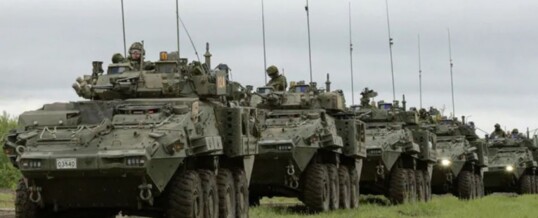
McLeod Group blog by Stéphanie Bacher, October 18, 2019
In its 2019 platform, the Liberal Party claims that “Canada has earned its place in the world, anchored by a reputation for defending democracy, human rights, and the rule of law”. This statement seems completely at odds with the Trudeau government’s position on Canada’s arms exports to Saudi Arabia, which has been a major concern for many human rights organizations.
In 2014, the Conservative government of Stephen Harper brokered a secret deal between an Ontario-based company, General Dynamics Lands System, and Saudi Arabia for the sale of over 900 light armoured vehicles (LAVs) and their maintenance worth about $15 billion. The Trudeau government subsequently approved the deal, before facing additional pressure in 2016 to cancel it, after the release of pictures showing these Canadian armoured vehicles in the Saudi-led war in Yemen. However, the then Minister of Foreign Affairs, Stéphane Dion, responded that cancelling the deal would cost taxpayers huge financial penalties.
Pressure to cancel the sale re-emerged last year after the murder of the Saudi journalist Jamal Khashoggi inside the kingdom’s consulate in Istanbul, allegedly ordered by Prince Mohammed bin Salman. Only then did the Canadian government announce a review of its arms exports to Saudi Arabia and prohibit any new arms sales. The LAV deal, however, remained in place.
A year has passed and the government has remained silent on this issue, despite numerous calls from civil society organizations and other actors to take action. The status of the review is unclear.
On August 6, a coalition of 12 Canadian civil society organizations sent an open letter to Prime Minister Justin Trudeau, expressing their concern that Canada hadn’t yet completed its review of military exports to Saudi Arabia, or at least communicated the outcome of that review. They didn’t receive any response from the Liberal government.
In another attempt to force the government to act on this matter, University of Montreal law professor Daniel Turp sent a letter to Chrystia Freeland, the Minister of Foreign Affairs, at the beginning of September, urging her to halt current and future arms exports to Saudi Arabia. She didn’t respond to his letter. Now Turp is considering suing to force the government to cancel the remaining LAVs exports to Saudi Arabia.
Two weeks ago, a new video showed Canadian-made light armoured vehicles captured by rebels in Yemen. In response, GAC spokesperson Adam Austen said that the government had not taken any final decision on its export permits to Saudi Arabia.
Why is it taking so long for the Liberals release the outcome of their review? Is it out of fear of economic repercussions and that Saudi authorities won’t pay for the vehicles already delivered? Or is it for electoral reasons, including the jobs in Southern Ontario that are on the line? And how much additional evidence would the Canadian government need to finally act? After all, Canadian law does not require proof of the misuse of arms exports, only that there be a “substantial risk” of misuse. At this point, that threshold has clearly been met.
The four other federal political parties have a clear stance on the current arms deals with Saudi Arabia. While the Green Party, the New Democratic Party and the Bloc Québécois would all cancel it, only the Conservative Party would proceed with the sale.
The Canadian government should be upfront on its position on current and future arms deals with Saudi Arabia. It should not let the courts decide in its place, undermining Canadian claims of their country being a global defender of human rights.
Other countries, including the United Kingdom, Germany, Sweden and Denmark, have already suspended or cancelled their deals with Saudi Arabia. Even the United States Congress has been active on this case, adopting a resolution aimed at blocking sales of military weapons to Saudi Arabia over concerns about the civilian casualties in Yemen. It is too late for the Canadian government to be a global leader on this issue, but at least it could live up to Canada’s human rights commitments.
Stéphanie Bacher is a Ph.D. candidate at the School of Political Studies, University of Ottawa.
